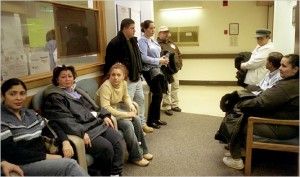 The following vignette happens to come from London, but it could have happened anywhere in the world. The author, Richard Horton, is a physician and the editor-in-chief of The Lancet.
The following vignette happens to come from London, but it could have happened anywhere in the world. The author, Richard Horton, is a physician and the editor-in-chief of The Lancet.
The new University College London Hospital is a gleamingly modern institution. Filled with space and light, the physical interior signals a warm welcome to visitors. It’s a pity, therefore, that a fraction of the human encounters with staff suggest the contrary trait of indifference.
Recently, I had an opportunity to spend time in the second floor specialist x-ray reception. I arrived at 8•40 am. The person sitting behind reception had a debilitating condition that rendered him unable to say good morning, smile, or to offer a polite hint of understanding for the anxiety a visitor might be feeling. “Take a seat and they’ll call you”, was the best he could do. The same words were repeated blankly to every new patient. Any further question was met with either a shrug or “don’t know.”
I gathered from conversations among those of us waiting that one man had been sitting in reception since 7 am. Well into his 70s, he was clearly nervous, biting his lower lip and muttering silently to himself. Occasionally, he pulled his appointment letter from his bag to double-check the instructions. He walked to the reception desk to ask what had happened. The same careless shrug, with another, “Just take a seat and they’ll call you”. Unable to see a way through this wall of unhelpfulness, he did as he was told. Eventually, he asked a passing nurse for help. She listened and looked him in the eye. But she said that sorry, she could not assist him. He must wait.
Increasingly forlorn, he rebelled. He walked out to find someone who would help him. A nurse returned and began asking reception staff what was happening. More shrugs and obfuscations. The nurse eventually managed to extract from reception the name of the doctor the patient was supposed to see. She reassured the man that the doctor would be called. Seeing that the patient was decidedly sceptical, the nurse promised to return. It was now 9•30 am, two-and-a half hours since the man’s arrival.
By 10 am, as I left, the doctor had been found and was talking with the patient. A happy resolution to a small drama. But no thanks to some staff, who showed no interest and little compassion in solving his predicament or offering him their help. A beautiful hospital does not make up for bad attitudes.
Related posts:
The doctor/patient relationship: What have we lost?
Contempt and compassion: The noncompliant patient
The Economist reviews Kaiser Permanente health care
Health inequities, politics, and the public option
Resources:
Photo source: Tipping Points
Richard Horton, Offline: Just take a seat and they’ll call you, The Lancet, July 3, 2010, Vol. 376 Issue 9734 p. 12 (free registration required)


Sorry, comments are closed for this post.